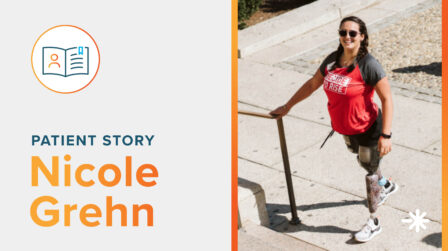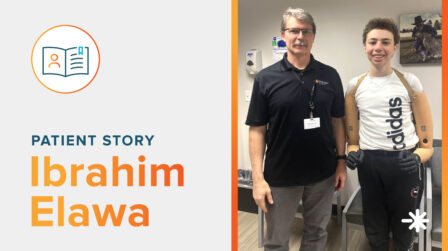Dealing with Grief

Grief is a process, and each person handles it differently. Advice from therapist Kathryn Martin can help you find a starting point.
Written by Kathryn Martin, LMFT
Losing a part of your physical body can seem like you aren’t yourself anymore. How will you move forward? Most people are flooded with questions and confusion, and a multitude of feelings.
You may feel scared, devastated, angry, confused–all in varying combinations and strengths at various times during the recovery process. People deal with things differently based on who they are and who is around them. Don’t feel pressured to follow a prescribed way of feeling or grieving.
Grief is a necessary, needed process. In order to move past the loss, you must allow yourself to be sad, as it’s the natural process of healing.
What if my sadness is so overwhelming, I can’t get over it?
One of my favorite psychology professors, Dr. Joan Rosenberg, Ph.D., described emotions to us like this: Feelings are like the ocean on the beach. If we let them come in on the sand, they stay there for a moment, and then they always go back out again.
We have to let the water roll in and flow back out. If we build a dam to hold back the water, it will overflow without proper management. When we don’t allow emotions to be felt, difficult feelings then build up and contribute to behavior we may regret. If I’m feeling bad, and I don’t talk about it and express it, it eventually comes out in ways I’m not proud of–I am snotty to my partner, I don’t keep commitments to others, I say things I’m not proud of, and I feel less motivated.
Few of us willingly undergo change. It almost always takes a transformational crisis to make us question ourselves and reassess our priorities. Most often it is hardship or heartbreak that provides us with the do-or-die moment that offers us the opportunity for profound change. Yes, life’s dangers are real, but so are the dragon’s wings: – it’s passion and its courage. It will come through this crisis tempered, strengthened and wiser.
The Artist’s Way At Work
The Star Exercise
When I work with new clients in my psychotherapy practice, I like to introduce the “Whole Star.” It’s an activity I appreciate because it helps us look at ourselves more fully. More WHOLE-ly. It goes like this:
- Draw a star.
- Using the shape of the star, label each of these parts of you: Relational, Mental, Emotional, Spiritual, Physical.
- Decorate, design, create, color each section to represent these aspects of you. Make yourself known using the star.
What do you notice as you look at your star? What sections are more empty or were more difficult to create? Perhaps you can show your star to someone else and hear their objective feedback on what they notice. Does your representation of yourself look the way you’d like it to?
As a whole, complex being, we are more than our physical selves, more than our emotional selves, and more than our intellectual selves. When we become very focused on one area, other aspects can be neglected, tipping the balance of wellbeing. Safety, serenity and joy are possible when things are in balance, which is the continual journey of life.
As you look at your star, what would you like to be different?
Here are some suggestions for exploring each area. Be mindful of balance and the importance of each section, as well as how the areas overlap and assist each other.
Relational/Social
What groups do you consider yourself a part of? Participation in academic, faith, hobby-related, and neighborhood groups contributes to social and relational wellbeing. Which of these could you participate in more? What new groups could you find? Recovery groups can be invaluable, especially early on.
Mental/Intellectual
What do you do to challenge your brain? Explore apps for your phone, or pick up a book of Sudoku, crosswords, or word searches. What is the last book you read? Have you tried Lumosity ? Increase your brain capacity to increase your mental and intellectual abilities and aptitude.
Emotional
How good is your emotional vocabulary? Do you know what feelings you are feeling on a given day or in a given hour? Check in each day at a specific time (i.e., lunch time, before bed), and think about what feelings you felt that day. Did you notice in the moment what you were feeling? Were there times during the day you aren’t sure how you felt emotionally? What do you notice about other people’s emotions? How do you know other people are feeling something, even when they don’t say it out loud?
Spiritual
What are your core values? How do you use your core values to determine your choices? Spending time outside or with good music can help forge spiritual connection. Taking time to be silent and simply listen (to your breath, to the wind, to the air conditioner, etc.) calms the mind and allows you to relax.
Physical
You will be learning new things about your physical self in the months to come. Be certain that, with the focus on caring for your physical body in new ways, you don’t neglect the other areas of who you are. Life is about continual attempts to balance who we are and care for ourselves completely. Don’t isolate and don’t give up.
Latest Updates
Subscribe to stay up-to-date on our latest posts.


